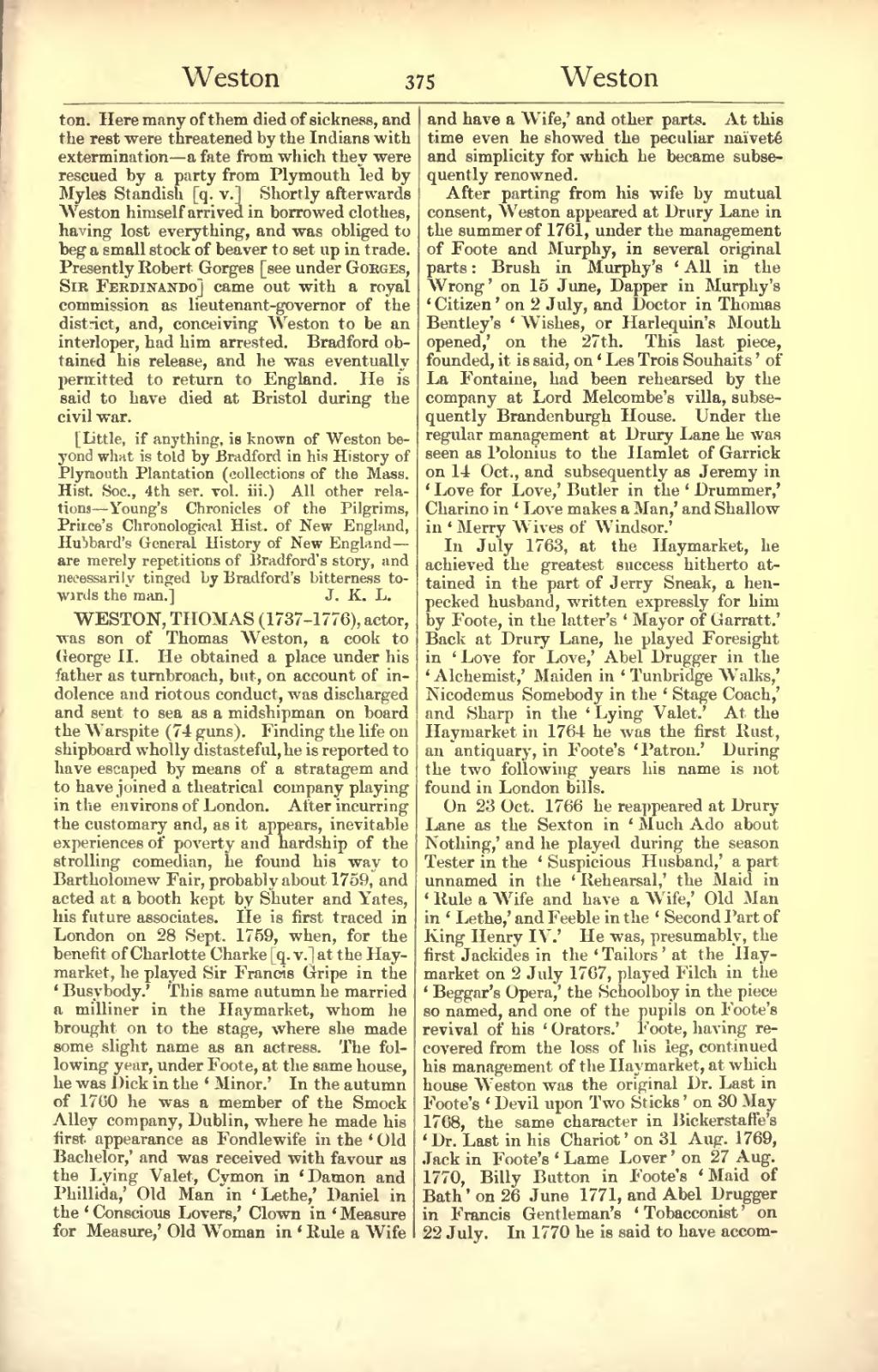ston. Here many of them died of sickness, and the rest were threatened by the Indians with extermination—a fate from which they were rescued by a party from Plymouth led by Myles Standish [q. v.] Shortly afterwards Weston himself arrived in borrowed clothes, having lost everything, and was obliged to beg a small stock of beaver to set up in trade. Presently Robert Gorges [see under Gorges, Sir Ferdinando] came out with a royal commission as lieutenant-governor of the district, and, conceiving Weston to be an interloper, had him arrested. Bradford obtained his release, and he was eventually permitted to return to England. He is said to have died at Bristol during the civil war.
[Little, if anything, is known of Weston beyond what is told by Bradford in his History of Plymouth Plantation (collections of the Mass. Hist. Soc., 4th ser. vol. iii.). All other relations—Young's Chronicles of the Pilgrims, Prince's Chronological Hist. of New England, Hubbard's General History of New England—are merely repetitions of Bradford's story, and necessarily tinged by Bradford's bitterness towards the man.]
WESTON, THOMAS (1737–1776), actor, was son of Thomas Weston, a cook to George II. He obtained a place under his father as turnbroach, but, on account of indolence and riotous conduct, was discharged and sent to sea as a midshipman on board the Warspite (74 guns). Finding the life on shipboard wholly distasteful, he is reported to have escaped by means of a stratagem and to have joined a theatrical company playing in the environs of London. After incurring the customary and, as it appears, inevitable experiences of poverty and hardship of the strolling comedian, he found his way to Bartholomew Fair, probably about 1759, and acted at a booth kept by Shuter and Yates, his future associates. He is first traced in London on 28 Sept. 1759, when, for the benefit of Charlotte Charke [q. v.] at the Haymarket, he played Sir Francis Gripe in the ‘Busybody.’ This same autumn he married a milliner in the Haymarket, whom he brought on to the stage, where she made some slight name as an actress. The following year, under Foote, at the same house, he was Dick in the ‘Minor.’ In the autumn of 1760 he was a member of the Smock Alley company, Dublin, where he made his first appearance as Fondlewife in the ‘Old Bachelor,’ and was received with favour as the Lying Valet, Cymon in ‘Damon and Phillida,’ Old Man in ‘Lethe,’ Daniel in the ‘Conscious Lovers,’ Clown in ‘Measure for Measure,’ Old Woman in ‘Rule a Wife and have a Wife,’ and other parts. At this time even he showed the peculiar naïveté and simplicity for which he became subsequently renowned.
After parting from his wife by mutual consent, Weston appeared at Drury Lane in the summer of 1761, under the management of Foote and Murphy, in several original parts: Brush in Murphy's ‘All in the Wrong’ on 15 June, Dapper in Murphy's ‘Citizen’ on 2 July, and Doctor in Thomas Bentley's ‘Wishes, or Harlequin's Mouth opened,’ on the 27th. This last piece, founded, it is said, on ‘Les Trois Souhaits’ of La Fontaine, had been rehearsed by the company at Lord Melcombe's villa, subsequently Brandenburgh House. Under the regular management at Drury Lane he was seen as Polonius to the Hamlet of Garrick on 14 Oct., and subsequently as Jeremy in ‘Love for Love,’ Butler in the ‘Drummer,’ Charino in ‘Love makes a Man,’ and Shallow in ‘Merry Wives of Windsor.’
In July 1763, at the Haymarket, he achieved the greatest success hitherto attained in the part of Jerry Sneak, a henpecked husband, written expressly for him by Foote, in the latter's ‘Mayor of Garratt.’ Back at Drury Lane, he played Foresight in ‘Love for Love,’ Abel Drugger in the ‘Alchemist,’ Maiden in ‘Tunbridge Walks,’ Nicodemus Somebody in the ‘Stage Coach,’ and Sharp in the ‘Lying Valet.’ At the Haymarket in 1764 he was the first Rust, an antiquary, in Foote's ‘Patron.’ During the two following years his name is not found in London bills.
On 23 Oct. 1766 he reappeared at Drury Lane as the Sexton in ‘Much Ado about Nothing,’ and he played during the season Tester in the ‘Suspicious Husband,’ a part unnamed in the ‘Rehearsal,’ the Maid in ‘Rule a Wife and have a Wife,’ Old Man in ‘Lethe,’ and Feeble in the ‘Second Part of King Henry IV.’ He was, presumably, the first Jackides in the ‘Tailors’ at the Haymarket on 2 July 1767, played Filch in the ‘Beggar's Opera,’ the Schoolboy in the piece so named, and one of the pupils on Foote's revival of his ‘Orators.’ Foote, having recovered from the loss of his leg, continued his management of the Haymarket, at which house Weston was the original Dr. Last in Foote's ‘Devil upon Two Sticks’ on 30 May 1768, the same character in Bickerstaffe's ‘Dr. Last in his Chariot’ on 31 Aug. 1769, Jack in Foote's ‘Lame Lover’ on 27 Aug. 1770, Billy Button in Foote's ‘Maid of Bath’ on 26 June 1771, and Abel Drugger in Francis Gentleman's ‘Tobacconist’ on 22 July. In 1770 he is said to have accom-
